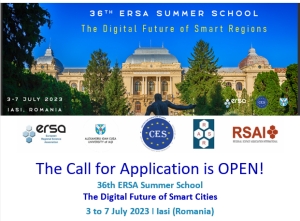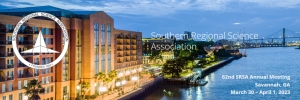Obituaries
Elisabete Martins
Call for Applications | Workshop on Geo-text Data Analysis in Regional Science: recente advances and best practices, 24-26 May 2023, University of Groningen
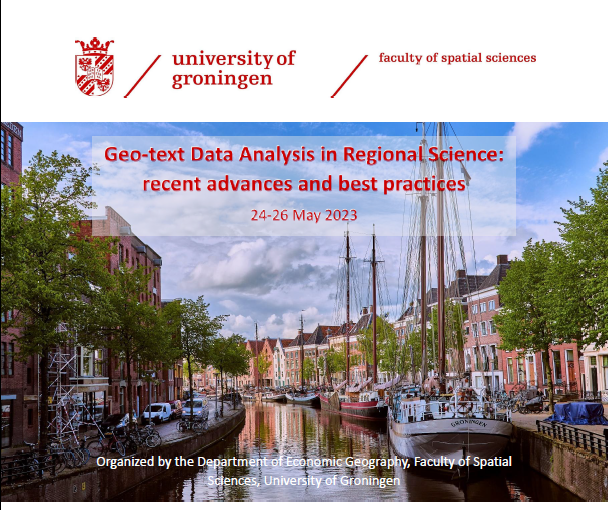
Background and objectives
The exponential growth of ‘big data’ coupled with enhanced computational capacity and high-performance machine learning techniques provides high-potential research opportunities for the field of Regional Science. User-generated text data is of particular interest, as it often has implicit spatial information embedded within (e.g., informal place references, place relations, place opinions/emotions). These types of geo-text data (Hu, 2018) can shed new light on regional economic development, labor market dynamics, and geographies of knowledge production and knowledge relations in a way that traditional secondary data cannot. Some studies in regional studies have already used this new geo-text approach, for example, the digital footprint of interfirm linkages (Kinne and Axenbeck 2020; Abbasiharofteh, Kinne, and Krüger 2021), Twitter data and news items (Ozgun and Broekel 2021), online job vacancies (Acemoglu et al. 2020), but also digitized historical newspaper archives (Peris, Meijers, and Van Ham 2021).
Textual data offers numerous advantages. It gives us the ability to create a bottom-up classification of groups and definitions rather than relying on existing definitions. Combined with web scraping techniques, it allows for high-volume flexible yet robust analysis. But there are also challenges concerning the reproducibility of results and online-data bias; nevertheless, geo-text analysis holds great promise for regional science research and should be leveraged much more than currently.
The aim of the geo-text workshop is threefold. First, this workshop invites leading experts to deliver keynote talks on their latest research findings on the topic and showcase recent methodology development. Second, this program creates a venue where about 20 early career researchers and PhD students in regional science learn from one another and discuss future research ideas and potential collaborations. All participants will be able to present their work and receive feedback from senior scholars and their peers. We would like to also encourage the exchange of information on the skills needed to perform text analysis, and we will have technical ‘sweat’ sessions in the program. Lastly, the workshop includes a social event and other opportunities to facilitate informal knowledge exchange, discussions, and brainstorming to inspire the next generation of researchers to take the next step.
Keynote speakers and publication options
We are happy that four distinguished scholars in the field of regional sciences will attend the workshop. Besides delivering keynote talks on the recent advances, case studies, and future challenges in using geo-text data analysis, they provide valuable feedback to presenters. The invited guests are:
- Tom Brökel, University of Stavanger, Norway
- Rikard Eriksson, Umeå University, Sweden
- Martin Henning, University of Gothenburg, Sweden
- Evert Meijers, Utrecht University, the Netherlands
A selected number of high-quality papers presented at the workshop will be proposed for further consideration in a special issue of an academic journal.
Submissions
We invite PhD students and early career researchers (five years between the date showing on their PhD certificate and the workshop date) to send us an extended abstract (max. 1000 words) featuring original and unpublished research on text analysis applied in geographic research, including but not limited to the following topics:
- geo-text mining - geographies of knowledge production
- novel datasets and analytical methods - geographies of green transition
- regional economic development - diffusion of clean technologies
- labor market dynamics - knowledge relations
- regional occupation space - place-based policy
To allocate enough room for discussion and feedback, each presenter has 45 minutes (including Q&A) to present his/her research.
Please send your extended abstract by 15 March to geotext@rug.nl which includes your name and affiliation.
Important dates*
Paper submission deadline: 15 March 2023
Acceptance notification: 31 March 2023
Material submission for discussants: 15 May 2023
Workshop days: 24-26 May 2023
* All deadlines are at 11:59 CET on the corresponding date
Workshop organization and costs
The workshop will be held in the vibrant city of Groningen, known for its rich history, charming canals, cobbled streets, and thriving cultural scene. The faculty of Spatial Sciences at the University of Groningen is recognized internationally for excellence in research and teaching in spatial and regional sciences. The geo-text workshop is planned as a three-day event, organized in a workshop atmosphere with keynote talks and thematic paper sessions with PhD students and early career researchers’ presentations. The workshop includes a lightning session and a tutorial.
Participation in the workshop itself is free of charge. We booked hotel rooms for presenting participants. We cover the costs of the hotel, and the workshop includes lunches, refreshments, and two dinners. Participants need to cover other costs associated with their travel themselves. The workshop is supported by the Regional Science Association International (RSAI) and the European Regional Science Association (ERSA) and facilitated by the Jantina Tammes School for Digital Society, Technology, and Artificial Intelligence.
In Memoriam: Ronald E. Miller (1934-2023)

Ronald Eugene Miller, Professor Emeritus at the University of Pennsylvania, died unexpectedly on January 26, 2023, at the age of 89. He received the North American Regional Science Council’s David Boyce Award for Service in 1995 for his long, productive career as the Managing Editor of the Journal of Regional Science (1963-1996), as 1986-1987 Vice President of the Regional Science Association, as well as his administrative work at the Regional Department at Penn. In 2006, Regional Science Association International recognized Ron’s body of academic work through the Walter Isard Award for Scholarly Achievement. He was elected a Fellow of the Regional Science Association International in 2012. Ron is perhaps best known for co-authoring, with Peter D. Blair, three editions of Input- Output Analysis: Foundations and Extensions (1985, 2009, 2022).
Born in Seattle, WA in 1934, Professor Miller received a B.A. in Economics at Harvard University in 1955 under the tutelage of Robert Kuenne, who had written a dissertation under Walter Isard in applied input-output (I-O) analysis. Ron’s senior thesis won the Newcomen Prize in Business History, part of which was published in 1957 as “The Impact of the Aluminum Industry on the Pacific Northwest: A Regional Input-Output Analysis” in the journal Review of Economics and Statistics. After a hiatus as a Fulbright Scholar at the Universities of Heidelberg and Munich in 1956, Ron received an M.A. in Economics at the University of Washington in 1957 under then Assistant Professor Arnold Zellner. He subsequently enrolled as a Ph.D. candidate at Princeton University’s Department of Economics. As Ron liked to tell it, his dissertation committee was composed of three secondary authors: Richard Quandt of Henderson & Quandt (1958), Microeconomic Theory: A Mathematical Approach, an advanced microeconomics textbook standard; Oskar Morgenstern of von Neumann & Morgenstern (1944), Theory of Games and Economic Behavior; and Robert Kuenne of Isard & Kuenne (1953), “The Impact of Steel upon the Greater New York–Philadelphia Industrial Region,” an early application of input-output analysis for measuring economic impacts. Ron’s 1961 dissertation was published by the MIT Press in 1963 as Domestic Airline Efficiency: An Application of Linear Programming. It should be no surprise then that his career focused on mathematical economic modeling.
In 1962, Ronald E. Miller, Ph.D., joined the recently formed Regional Science Department at the University of Pennsylvania. There he joined Walter Isard, Benjamin H. Stevens, and their first Ph.D. student, William Alonso. Forever the prototypical Princeton alumnus, Ron quickly developed into a talented teacher and professor, advising scores of graduate students and receiving Penn’s highest award for teaching in 1988. University-wide, his courses perennially ranked near the top in undergraduate student evaluation scores. His basic input-output (I-O) course was required for both graduate and undergraduates in Penn’s Regional Science Department. Lecture notes from these classes as well as from an advanced “topics in I-O analysis” seminar later culminated into early chapters of the 1985 edition of Input-Output Analysis: Foundations and Extensions once Peter Blair joined the Department’s faculty in the mid-1970s. He taught other courses on mathematical programming as well. In 1995, Ronald E. Miller was promoted to Professor Emeritus status by the University of Pennsylvania, to which he had loyally devoted his entire career.
Professor Miller authored and co-authored scores of articles, authored or co-authored six books, and edited two volumes. After publishing his dissertation, Ron refocused his research attention on measuring interregional feedback effects in multiregional I-O models. The earliest of these works are still widely cited today for their development of a technique called “hypothetical extraction,” the first of which (1963) corrected some equations in a salient piece by Professor Leon Moses then at Harvard University.
Ron’s broad knowledge, instant recall of obscure articles, and careful editorial eye will be sorely missed. He also was a frequent and willing manuscript referee and an occasional book reviewer. Ron was also known by colleagues and students for his tidy and organized office and with rare exceptions keeping an immaculate desktop. This led his less orderly, but very close colleague Ben Stevens to assert publicly that “Ron’s so neat he keeps his telephone in a drawer.” When queried about this later, Ron chuckled, replying that just prior to Ben’s weekly arrival to his office Ron made sure to tuck the telephone in his desk. Needless to say, it was great to be within earshot of the banter between these two fast friends. In any case, Professor Ronald E. Miller’s humor and wit will be remembered fondly. It could be snarky and at times biting but was always delivered with a smile and twinkling eyes and in a gentlemanly manner.
Books Authored or Coauthored.
Edited Volumes.
Doctorales ASRDLF 2023, 26 et 27 janvier 2023
Les Doctorales 2023 ASRDLF auront lieu à Tours, les 26 et 27 janvier 2023.
Elles sont organisées par l’UMR7324 CITERES (Équipe DATE) à l’université de Tours.
Comme vous le savez, ces journées s’adressent aux doctorant(e)s et aux chercheur(e)s qui travaillent sur les problématiques territoriales et régionales de sciences humaines et sociales (aménagement, économie, urbanisme, géographie, gestion, histoire, droit, sciences politiques, sociologie, etc.).
Elles sont un temps d’échanges et de débats privilégiés entre jeunes chercheurs et chercheurs confirmés. Elles se déroulent sous la forme d’ateliers thématiques ou méthodologiques au cours desquels, les doctorants présentent leurs travaux de thèse devant plusieurs enseignants-chercheurs, chercheurs confirmés et autres jeunes chercheurs afin de partager les regards, d’enrichir les expériences et de récolter des conseils sur leur travail.
1st International Conference on Sustainable Regional Development in Central Asia May 11-12, 2023 | Narxoz university, Almaty, Kazakhstan
Sustainable Regional Development in Central Asia"
(Ryskulov Readings - 2023)
This year, on May 11 and 12, Narxoz University , together with The Regional Science Association International , is holding an international conference on sustainable development in Central Asia "The 1st International Conference on Sustainable Regional Development in Central Asia" (Ryskulov Readings - 2023).
RSAI is the publisher of the Regional Science Policy & Practice (RSPP) - Q2 journal in the Scopus database. According to our agreement, all abstracts approved for presentation by the scientific committee of the conference will be considered by the editors of the journal for publication in the format of an article absolutely free of charge. All other papers will be published in the conference proceedings.
The conference is also dedicated to a significant date - the 60th anniversary of Narxoz University. The university, established in 1963, has trained more than 140,000 graduates for the economy of Kazakhstan, and in 2023 Narxoz draws a jubilee line under its past and reveals grandiose plans for the future.
PRSCO 2023, Siem Reap, Cambodia, 13-14 June 2023.
The main theme of 18th PRSCO Summer Institute is Economic and Social Transformation Amidst the Multi-Pronged Global Crisis and it will be held in Siam Reap, Cambodia, on 13-14 June 2023. The Institute aims, among others, to encourage more discussion on current policies and programs in promoting regional economic development in Cambodia and the region, particularly Myanmar and Laos, and to encourage more research and innovation on this topic. The summer will also provide opportunities for researchers all over the world, particularly those in the Asia-Pacific region, to present their ideas on the topics of regional development, regional planning, industrial development, trade, institution, public finance and other related issues, including the environment.
The Institute is hosted and organized by the Asian Vision Institute, in collaboration with the Pacific Regional Science Conference Organization (PRSCO). The Asian Vision Institute (AVI) is an independent think tank based in Phnom Penh aiming to promote inclusive, adapting and sustainable societies in Asia.”
Call for Papers | 1st International Conference on Sustainable Regional Development in Cities and Territories in the Developing World, 28-29 April 2023, Hammamet-Tunisia
Cities and territories in the developing world facing the challenges of ecological and digital transitions. A South-North perspective
28-29 April 2023 | Hammamet-Tunisia
https://conferencetunisia.weebly.com/
Framework
Call for papers
Given that urbanisation goes hand in hand with economic growth[3], it is legitimate to ask whether or not this urban transformation offers the countries of the South a new development opportunity and the promise of a better quality of life. In reality, it can be assumed that this will depend on how the South conceives, governs and manages its cities and territories.
In the South, the particularly rapid growth of cities - which is accompanied by a massive flow of goods, people and information, both tangible and intangible - poses major challenges related to global health, economic, social, ecological and climate issues, especially for city dwellers who live mainly in informal settlements and for people who have migrated from rural areas.
The growth of cities is not just a demographic phenomenon. It is also a fundamental transformation in the nature and scale of economic production, social structures, patterns of interaction and land use, city-nature relationships[4], etc. Such a transformation has profound impacts on resource, capacity and governance requirements. The densification of cities increases the need for complex systems for water and energy supply, natural environment protection, health, safety, waste management and related infrastructure.
In response to these environmental and societal challenges, cities and territories must reinvent themselves to seize the opportunities that arise. These challenges are expressed in terms of economic development, well-being[5] and social and institutional change. As a result, new narratives and new specific and contextualised solutions are being expressed in both the North and the South. New ways are emerging to define 'imagined' cities that are more functional, more attractive, more inclusive, more cooperative, more respectful of their environment, less selective and less enclave. The question then arises as to how to reconcile the functioning of an "ordinary" economy (capable of meeting basic social and local needs) with the rise of an "extraordinary" economy (technological, innovative, competitive, etc.).
Thinking about sustainability in the cities and territories of developing countries implies broadening our field of investigation and reflection. It is a question of trying to produce development models and alternatives adapted to the socio-economic and environmental epistemology of the cities of the South by relying on their potentialities and their resilience capacities. Fortunatly, the economic literature and public policies on innovation have abandoned a restricted vision centred on the technical dimension alone, which is well suited to the countries of the North. Considering innovation and the policies dedicated to it under a broader prism is a promising path for the sustainable development of cities and territories in the South. Whether technological, organisational, societal or institutional, in the North as in the South[6], innovation becomes the major element that 'forges the territory', fuels local socio-economic development and makes it possible to overcome traditional disciplinary modes, which produce massive nuisances and individual and collective malaise. This suggests - as Pugh (2013)[7], Barthel and Monkid (2011)[8] and many others point out - that, against the tide of supposed global convergence, the countries of the South need to invent their own sustainable development systems while drawing on the models, policies and tools of the pioneering sustainability cities.
The aim of this conference is to understand the trends that affect the strong urbanisation of cities in the developing world and to identify the appropriate responses to invent the sustainable city of tomorrow. The various dimensions of transition (economic, social, ecological, digital, institutional, spatial, cultural) will be studied through the prism of innovation in order to understand how it can reorient territorial development trajectories in a context of increased uncertainty and acute inter-territorial competition[9]. While the primary objective of this conference is to better understand the challenges of urban transition in the South, it is also expected that contributions will address the dynamics of transition in the cities of the North and the responses to global challenges (environmental, climatic and societal) that are being made there.
This general theme can be approached from many angles, including but not limited to :
- Ecological and digital transitions, innovations and the city of the future
- Entrepreneurship and sustainable urban development
- Sustainable transport and logistics
- Local policies, social economy and social innovation
- Institutional innovations and urban governance
- Transformation of city-nature relations
- Industrial and territorial ecology
- Finance and regional development
- Climate change and resilience
- Migration and development of cities in the South
- Econometric and spatial modelling and city growth
- Health, education, food security and urban growth
Authors are asked to provide the following:
- Contact details of the author(s) (surname, first name, title, affiliation, e-mail).
- The title of the proposal
- An 800 word abstract describing the purpose of the paper, the context, the method used and the expected results.
- A list of 5 key words
- Ten or so bibliographical references
[1] Pugh C (2013), Sustainable Cities in Developing Countries. London, Routledge
[2] Lejardins X (2021), l’aménagement du territoire. Armand Collin.
[3] Banque mondiale (2008)
[4] Carrière et al. (2021), Faire nature en ville. L’Harmattan.
[5] Bourdeau-Lepage (2022), Révéler les aspirations des citadins pour des villes amènes. L’outil Tell_Me, in Urbanisme du bien-être. Des initiatives à partager.
[6] wd Barthel P-A et Zaki L (2011), Expérimenter la ville durable au sud de la Méditerranée. Chercheurs et professionnels en dialogue, Coll. Villes et Territoires, Edition de l’Aube, La Tour-d’Aigues.
[7] Pugh C (2013), Sustainable Cities in Developing Countries. London, Routledge
[8] Barthel P.A et Monqid S. (2011), Introduction. Cairo and sustainability: a provocative issue? Égypte/Monde arabe, 8/2011, document 8, Online since 01 September 2012.
[9] Hamdouch A., Depret M.-H. et Tanguy C. (Eds.), Mondialisation et résilience des territoires. Trajectoires, dynamiques d’acteurs et expériences, Presses de l’Université du Québec, Québec, 2012, 292 p.
36th ERSA Summer School - The Call for Application is OPEN
|
|
|
|
|
|
|
|
|
RSPP Special Issue Award
RSPP Special Issue Award
For the Best Special Issue Editors in Regional Science Policy and Practice
RSPP Special Issue Award aims to stimulate the quality of an enlarged editorial team focused in the edition of Special Issues.
RSPP Special Issue Award prizes the special issues with more than seven papers, published two years before based on their citations per paper and the judgement of a jury composed by three Fellows, the President and the Immediate Past President.
Winners 2024
Following the rules of the RSPP Special Issue Award the recipients of the RSPP Special Issue Award in 2024 based on the special published in 2022 and approved by the Jury composed by by Hans Westlund, Eduardo Haddad, David Plane, Bruce Newbold, Philip McCann and Neil Reid are:
|
|
Winners 2023
Following the rules of the RSPP Special Issue Award the recipients of the RSPP Special Issue Award in 2023 based on the special published in 2021 and approved by the Jury composed by Hans Westlund, Eduardo Haddad, Gordon Mulligan, David Plane and Phillip McCann are:

1st Place Neil Reid for the Special Issues on “Effects and Policies of Covid-19” with 8 papers and 44 Cite Score citations (ratio 5,50) in September 2023.
|
|
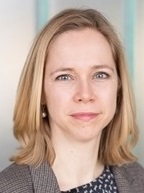 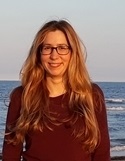
2nd Place Eveline S. van Leeuwen and Solmaria Halleck Vega for the Special Issue “Voting and the rise of populism: Spatial perspectives and applications across Europe” with 10 papers and 50 Cite Score Citations (ratio 5,00) in September 2023. |
|
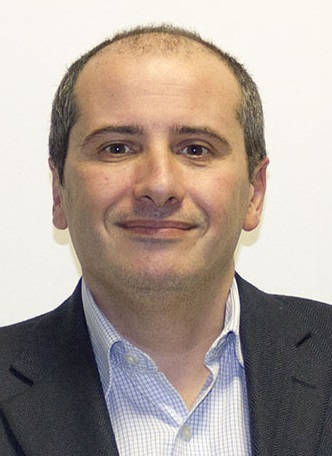
3rd Place Paolo Postiglione for the Special Issue “New directions for regional analysis: Methods and applications” with 11 papers and 49 Cite Scores citations (ratio 4,45) in September 2023. |
1. Goal
The Award recognizes annually the RSPP Special Issue, published two years before that, having obtained high citations per article, clearly demonstrated the use of advanced replicable methods, rooted in the regional science and with effective evidences for policy makers on emerging topics related to human interaction within space.
2. The Award
2.1 The award recognizes and honours editors of RSPP special issues that manage to select, with a rigorous blind review process, a set of complementary and original contributions on emerging topics of human interaction within space. The editor in chief cannot receive the award.
2.2 The Prize is annual and awards the best Special Issue with more than seven papers, published two years before on Regional Science Policy and Practice.
2.3 The Award selects one Special Issue per year and, exceptionally, two that will divide the award equally.
2.4 The Award involves the payment of 750 €, one plaque and certificates for the editors of the Special Issue.
3. Jury and Process for Recommending the Award
3.1 In September of each year, the Editor in Chief of Regional Science Policy and Practice ranks the Special Issues of two years before according to the total number of citations per number of papers of the Special Issue.
3.2 The Editor-in Chief of Regional Science Policy and Practice send the ranks of the Special Issues for appraisal to the jury composed by three Fellows, the President of RSAI and the immediate past President of RSAI;
3.3 The Editor-in-Chief of Regional Science Policy and Practice will inform the Executive Director of RSAI of the decision of the Jury, and the Executive Director of RSAI will inform the recipient(s) of the Award.
3.4 The Awardee(s) will be invited to attend one of the Supra-Regional (NARSC, LACRSA, ERSA, PRSCO) meetings or the RSAI World Congress to receive the Award.
3.5 The first RSPP Special Issue Award will be granted based on the Special Issues published in 2021.
36th ERSA Summer School - The Call for Application is OPEN
|
|
|
|
|
|
|
|
|
Call for Papers - 62ndAnnual Meeting of the Southern Regional Science Association (SRSA)
|
||||||||||||
|
About Us
The Regional Science Association International (RSAI), founded in 1954, is an international community of scholars interested in the regional impacts of national or global processes of economic and social change.

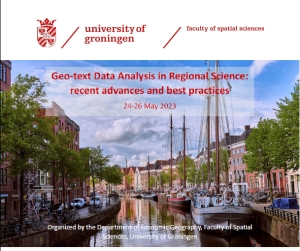

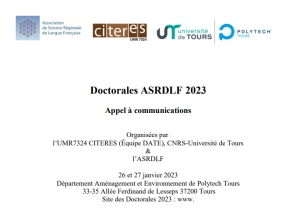
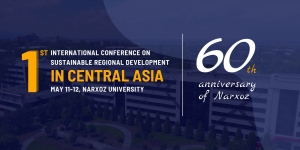

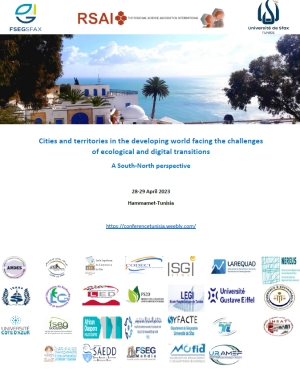
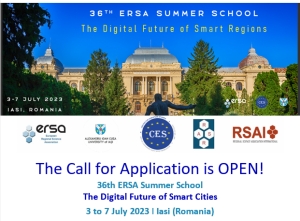



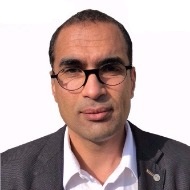

 Louafi Bouzouina, Karima Kourtit and Peter Nijkamp for the Special Issue 1 “
Louafi Bouzouina, Karima Kourtit and Peter Nijkamp for the Special Issue 1 “